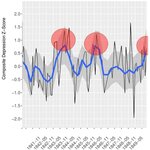
Your ears enjoy music but your heart may also benefit, according to a new study presented at the American College of Cardiology's Annual Scientific Session.
Patients with early post-infarction angina, episodes of chest pain after a heart attack, reported significantly lower levels of anxiety and pain if they listened to music for 30 minutes a day. While that's hard to pin down biologically, 700,000 people survive a heart attack just in the U.S. each year and roughly 1 in 9 heart attack survivors experience subsequent episodes of chest pain and anxiety within the first 48 hours…








